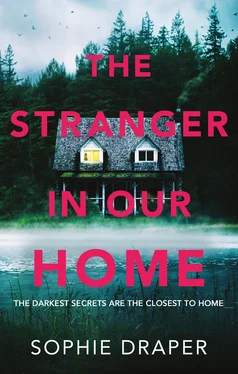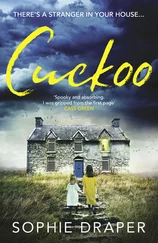I was reluctant to use the bedrooms on the first floor. No way was I going to sleep in Elizabeth’s room and, though I couldn’t explain it, I didn’t fancy the other ones either. But I needed a proper bed, I didn’t want another night on the sofa. I hung back, feet on the first step, then curiosity got the better of me and I climbed the stairs to the top floor.
My old bedroom was right under the eaves. It was the most neglected of all the rooms and hadn’t changed much. It didn’t surprise me, I could just picture my stepmother shutting the door after I’d gone and forgetting all about it. There was a single bed under the window overlooking the back of the house, a desk against the wall and a lamp tinged with yellow. A bookcase stood between a wardrobe built into the eaves and a small Victorian fireplace. The ceiling was low and, in the middle, a large spider dangled from a web strung out across a hatch into the roof. A fly was caught in its strands, still moving as the spider wrapped it with thread. I wanted to pull out my sketchbook, to record the shape of it suspended like it was, pencil lines capturing the spider’s legs, the way they tapered and moved, weaving silk with the delicacy of a pâtissier making spun sugar. I lowered my head. The room had seemed bigger when I was little.
I opened the wardrobe. The doors stuck; the wood had swollen and loose flakes of paint fell onto my fingers. Inside smelt of charity shop clothes, damp cardboard boxes and old bedding. I fished out a soft toy, a felt penguin. Its beak was bent and worn, its once white breast grey from a thousand childish cuddles. I’d had it for as long as I could remember. It was missing when I’d looked for it when packing to go to uni. I hadn’t realised then that I wouldn’t be back, even once; that I’d have to find jobs in the holidays to support myself. I held it for a moment, stroking its beak, then placed it gently on the floor.
I reached further into the cupboard. More stuff. A wooden doll, her clothes worn ragged, and a Monopoly set. I grimaced at the board game – I’d been thrilled to get it all those years ago, but I’d never had anyone to play it with, neither Steph nor Elizabeth had ever been interested. I would set up the bank, line up the penguin and doll and we’d play like that, the three of us. Sometimes I won, sometimes they won, that in itself had been the game, which toy would win. Sad, I thought. What a sad little girl I’d been.
I shut the wardrobe door and turned to the bookcase. Books had been my escape. Peter Pan , Five Go to Smuggler’s Top , Black Beauty , all classics. The Little Mermaid caught my eye, a picture book, its glossy pages smooth beneath my fingers. It had arrived in the post one year. I’d been first to the door that day. I wasn’t sure about the name on the card, some relative on my mother’s side, Elizabeth said. Whoever it was had never come to visit, at least as far as I knew. It had been a fantasy of mine, my mother’s relatives hammering at the door demanding to see me, but that had never happened. I pulled the book from the shelf. There was something about the story of The Little Mermaid . The sea princess who has to lose her place in the family and give up her beautiful voice, whose every step with her new feet felt like walking on a thousand shards of glass. Even then, she still didn’t get her prince. I’d read that story again and again.
The bed was by the window. My refuge, there where the light was best, where I could look out over the hills and immerse myself in stories of another time, another place, away from my existence at home. Something caught my eye, the corner of a book peeping out from under the bed. I reached down to pull it out. A collection of fairy tales. It had been one of my favourites. How could I have left it behind? Had that too been missing? I frowned.
I brought the book to my nose, drinking in the old-book scent, a mixture of woody glue and grass cuttings, old paint and vanilla candles. The pages fell open in my hands. It was as if the black ink already stained my fingers, my hands tracing the beautiful line drawings – princesses with long rope-like hair; trees gnarled like old man’s hands; lilies, roses and wild garlic blossoming around the words, winding about the letters. It was the book that had inspired me to paint, the fine detail, the insects under the leaves, the sense of a hidden, lush world of fantasy.
I’d first met Paul at the British Library, at an exhibition on fairy tales. There’d been old woodcut prints and illustrations from all the books I remembered from my childhood. H.J. Ford’s illustrations from The Fairy Books of Andrew Lang, Arthur Rackham’s prints for the collections of the Brothers Grimm, I’d been in heaven moving slowly from one display to the next. I was standing in front of a book, the pages open at the full-page picture of a cat perched like an owl upon a branch. By day she made herself into a cat. Its expression scowled at me, teeth and claws etched angrily onto the print, the dark shape of the animal like a black cloud bursting onto the sky. I’d scarcely noticed Paul at first, as I peered down at the book.
‘Not exactly the cute, cuddly kittens you see on Facebook,’ he’d said.
I’d swung round to look at him. He was tall and slim, dark-haired with a neatly trimmed beard and high pale cheekbones that made his eyes leap out from his face. He looked like he must be a writer or a poet, someone who spent his time in the proverbial garret, too intensely absorbed in his work to spend time outside in the sunlight. It turned out he was an accountant, working for the one of the firms that had sponsored the exhibition.
‘I don’t like cute, cuddly kittens,’ I said, only half a truth. I stood up and made to move on.
‘She was a witch,’ he said. ‘She turned women into birds, and men into statues.’
‘I don’t like stories about witches,’ I said. ‘It’s misogynism, pure and simple.’
He nodded in agreement. ‘Not helping the reputation of black cats, either. But look at the fur on her haunches, the way it echoes the lines of the storm clouds behind, and the tint of orange in her eyes. It’s not the cat that was being drawn but the repressed anger within.’
His hands were slender, pointing at the image, and a smile illuminated his face. As we talked, I imagined him standing trapped within the stained-glass window of a Victorian church like one of those translucent tortured saints. I found myself wanting to paint his face, to capture the angles of his features, the long line of his neck. One of my favourite artists had been Modigliani, known for the exaggerated necks and seductive features of his subjects. I felt the warm heat of a blush seeping across my face. Paul – even the letters of his name sparked that image in my head, long and lean, his legs white against the covers of my bed. Paul had been the man from my teenage fantasies, intelligent, courteous, patient. By the time we first slept together all my nervous reservations had gone.
I let the book drop from my fingers onto the floor of my old bedroom. I thought about the commission. The Pear Drum and Other Dark Tales from the Nursery . I hadn’t even started it and already two weeks had gone by. Too busy packing up to leave London. Or had I been avoiding it?
It was there on my phone, an attachment to David’s email. I reached into the wardrobe, pulled out a musty eiderdown, and dragged it over to the bed by the window. I propped up the pillows, arranged the eiderdown about my body and curled up with my phone, swiping through the emails to download the manuscript, then pausing to look out of the window. The sky was pastel pink, white mist shrouding the valley, trees fanning out against the horizon. The height of the window made me feel distant and alone, safe. The file loaded up and I scrolled through the contents, quickly passing over The Pear Drum to stop at a story I recognised, The Wild Swans . I settled down to read.
Читать дальше












